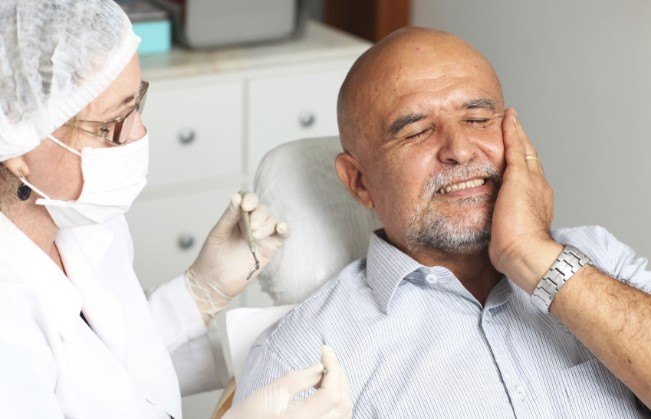Emergency Dentist – Kent, WA
Getting You Out of Pain Fast

Dental accidents happen to dentistry patients of all ages, and usually at the most inconvenient times. No one should have to suffer through pain and embarrassment while they wait for a regularly scheduled appointment. Here at Complete Dental Care, we want to be there for you and your family during these stressful times. Dr. Dhaliwal and his team are equipped with the latest dentistry technology to address all types of dental emergencies, including a severe toothache, a knocked-out tooth, a broken dental crown, and many other conditions. When dental accidents happen, call our dental office immediately for urgent dental care with our emergency dentist in Kent, WA. Our team will be able to provide you with instructions on how to best handle your situation.
Why Choose Complete Dental Care for Emergency Dentistry?
- Same-Day Emergency Appointments
- Experienced Team of Dentists
- We Accept Dental Insurance
How to Handle Common Dental Emergencies

When faced with a dental emergency, you’re typically looking at two different scenarios: long-term infections or sudden physical accidents. Thankfully, Dr. Dhaliwal can assist patients suffering from both. It’s important to remember to call our dental office as soon as possible to schedule an appointment. If we are unable to get you in immediately, we will walk you through the steps you can take at home until we can get you in to see the dentist.
How to Prevent Dental Emergencies

It’s unrealistic to think all accidents are avoidable. You can only proceed with caution to a point, but otherwise, it’s just the luck of the draw. However, there are some things you can do to lessen your chances of experiencing a dental emergency, including:
- Wearing a mouth guard while playing sports
- Brushing and flossing your teeth at home to keep your pearly whites and soft tissues healthy and strong
- Wearing a night guard while you sleep if you are prone to teeth grinding or TMJ
Preventive care is crucial in helping prevent dental emergencies. Why? Because the stronger your teeth are, the better. Weak teeth will be more likely to break or chip with less impact, and toothaches that develop from poor oral hygiene can result in a root canal or tooth extraction.
Cost of Treating Dental Emergencies

Unfortunately, there is no “set cost” as it pertains to dental emergencies. Everyone’s situation is different, which means treatment can vary. Multiple factors come into play when determining how much your dental emergency will cost. Some of these include:
- Prescription Care – Your injury may only need medication prescribed by Dr. Dhaliwal.
- Root Canal – If a toothache is the result of a severely decayed or damaged tooth, a root canal may be necessary in order to address the situation.
- Tooth Extraction – When a root canal is not enough to save a tooth, the suggested treatment might just be an extraction.
- Tooth Replacement – If you have a tooth that has been knocked out, and Dr. Dhaliwal cannot put it back in, it will be necessary to review your tooth replacement options to prevent further oral damage.
The only way to receive a reliable estimate is to make an appointment with us and allow Dr. Dhaliwal to examine the problem. Once he has determined the best way to treat your emergency, he will discuss the process as well as the cost.
Dental Emergency Frequently Asked Questions
When you find yourself saddled with a dental emergency, it can be confusing and panic-inducing. That’s why, to lessen your anxiety, we have decided to answer some of the questions about dental emergencies that we get asked the most often. If you have a question that you don’t see answered somewhere on this page, just give us a call and we’ll be more than happy to help you out.
Should I Go to the Emergency Room?
When you have a dental problem that needs urgent care, you might think that the emergency room of your local hospital is the place to go. However, you should only visit the ER as a last resort, such as if you knock out a tooth and your emergency dentist is closed. Most hospitals don’t have dentists on staff, so they aren’t really equipped to handle dental emergencies. Usually, the best they can do is provide prescription painkillers or antibiotics.
This, however, does not address the root of your dental emergency. It’s always best to contact us instead, as we have the specialized training needed to handle serious oral health problems. The only time you should visit the ER instead of us is if you are bleeding profusely (even after applying pressure to the area for 15 minutes), your jaw is broken or dislocated, or you are experiencing swelling that hinders your ability to swallow or breathe.
What if My Toothache Suddenly Goes Away?
Many people mistakenly believe that the occasional tooth pain is completely normal, but it’s actually anything but. As a rule of thumb, teeth don’t hurt for no reason. If you’re experiencing a toothache, however minor, it could be a cavity, fracture, or infection, all of which need medical attention as soon as possible to prevent the problem from worsening. Not to mention the fact that if your toothache suddenly goes away, it could mean the nerve inside the tooth has “died.” At this point, you’re going to need a root canal or tooth extraction to prevent the damage from spreading to the rest of your mouth.
I Can’t Afford to Go to the Dentist. Can I Wait for Treatment?
No one wants a large dental bill, but the longer you wait for emergency treatment, the worse your problem is going to get. What starts out as a cavity that only needs a small filling could rapidly spiral into an infection that requires a root canal, or even a tooth extraction. By that point, you have to get your tooth replaced with a bridge or dental implant, both of which can be costly. You’re much better off financially if you seek treatment as soon as you can.
How Can I Prepare for a Dental Emergency?
You might think that a dental emergency could never happen to you, but the truth is that 1 out of every 6 Americans will face one every year. Should you find yourself in this situation, you don’t want to be caught off guard. To make the situation a little less stressful, you can craft a dental emergency kit with the following items:
- A piece of paper with our contact information
- Handkerchief
- Small container with a lid
- Saline solution
- Bottle of ibuprofen (don’t use aspirin because it’s an anticoagulant, which can cause excessive bleeding)
Preventive Dentistry Restorative Dentistry Tooth Replacement Invisalign Periodontal Treatment Cosmetic Dentistry View Our Services

